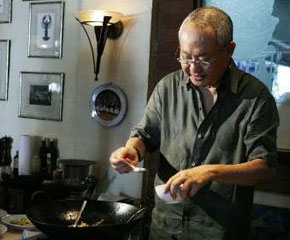Choosing recipes from his grandmother’s time, such as tempeh, or soybean cake, fermented in garlic and salt until it turns black, the 61-year-old chef introduces new twists to the old on his popular television cooking show Cooking Adventure with William Wongso.
He is the owner of three top restaurants, such as the showpiece, appointment-only, William’s Kafe Artistik in Jakarta, where businessmen woo clients with foie gras egg curd and tiny chocolate pianos.
Q: You’ve said that enlightening foreigners about the diversity of flavours in Indonesian cooking is one of your long-term goals. Do you think visitors to Indonesia typically get a good introduction to Indonesia cuisine?
A: “All they know is nasi goreng (fried rice), satay and maybe rendang (slow-cooked beef curry). With 17 000 islands and 600 dialects, there’s so much more.”
Q: Is this a problem for locals too, given the country’s geographic and cultural diversity? Do you want to encourage a more adventurous and appreciative gourmet culture at home?
A: “(Yes.) Even Indonesians are very narrow in their palate, very regional and a lot of food never travels to other regions.”
Q: What are some hidden treasures?
A: “From Aceh, at the most western tip of Sumatra island, I relish the intense sour taste that comes from the use of asam sunti made from salted, dried star fruit and used in seafood dishes.
Fermented coconut paste, known as pliu, made from the leftovers from the coconut oil-making process and spread on salad, is another favourite Acehnese flavour. It’s very rich and tasty, like the after-aroma on aged tempeh.”
Q: Balinese cooking is another of your favourites. What should visitors to Bali look out for?
A: “Spit-roast pork, in which the pig’s belly is stuffed with chilli, fermented prawn paste, galangal and turmeric, and “bebek betutu”, or betutu duck (the word ‘betutu’ describes the process).
There are two versions: in one, the duck or chicken is wrapped in a banana leaf and cooked slowly inside the ashes of a rice bran fire until the next day. The other kind, they boil with combination of mix spices.
Another unique thing is the Balinese salad lawar. It is a salad with the meat of different parts of the animal and they always add fresh duck blood. The flavour of the blood is very sweet and rich.”
Q: On your TV show you urge viewers to share your enthusiasm for the unusual and exotic. Do you think chefs get enough recognition in Indonesia?
A: “In Indonesia chefs are not celebrated – they are just cooks. When you socialise at a party, how many times do you talk to the chef? Never. They just stay out the back. The cook should be a celebrity.”

